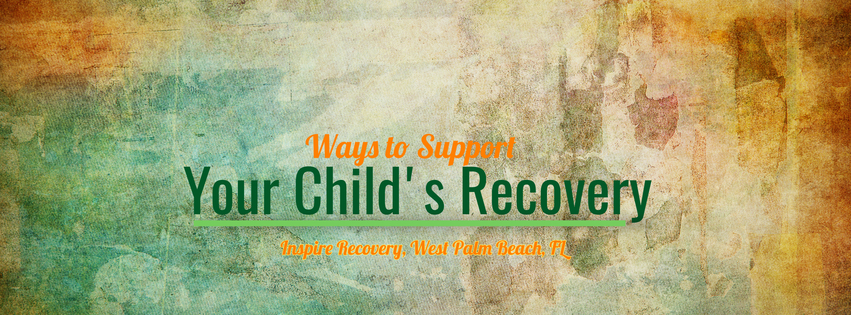Struggling with addiction recovery?
Inspire Recovery can help! Call 561-899-6088 for a free & confidential consultation.
Ways to Support Your Child in Recovery
Hands down, one of the scariest obstacle a parent can face with their child is navigating addiction. When a parent becomes aware of their child’s addiction, the first instinct is likely to get mad and the desire to keep your child safe at home without access to the outside world. Of course, restricting their independence is not a full-proof solution for a child in recovery. What if your child is in need of a detox? What if abstaining from drugs and alcohol for a short period of time creates a stronger desire for them to use? What if trauma or a mental health diagnosis is a root cause of their addiction?
The truth is, parents need support when they want to help their children—of either adolescent or adult age—to get the resources that can positively sustain their recovery from addiction. Before we dive into ways you can support your child in recovery, our first suggestion is for parents to also access resources to help you process the reality of addiction in healthy ways. See how parents are making a difference.
STEP BACK OR STEP UP!
A great place to start approaching your child in recovery is to acknowledge that you don’t have all the answers. You might need to step back from being a parent for a moment and trust professionals to provide for your son or daughter. Try and be conscious of what might be triggering or upsetting to your child in the early stages of their recovery process. This can be a really tough time for both of you, however, to see greater results in your child’s recovery, it is best if you’re able to step back a little bit from how you have communicated in the past. For some parents that might mean to STEP UP in their style of communicating. There are plenty of parents who have been more absent than present in their child’s life, and addiction could be what your child used to fill the void. Truths as painful as these are why it is advised for parents to do see a counselor while your child is getting the help they need.
LISTEN UP, BE CURIOUS
Again, as parent’s you might feel like you always have the answer, which can be true for many parents most of the time. However, the drug and alcohol addiction treatment industry is providing the best possible care for your child during an incredibly difficult time. Be mindful that something that you say might contradict what your child is being told by their licensed therapist and other trained healthcare professionals. By being curious about what kinds of groups and treatment services your child is accessing at their treatment center, you are open a window of opportunity to show interest in their recovery. Avoid asking your child about what they are discussing with their therapist, as that might not be what your child wants to discuss with you at this time. It is also a good practice to be aware of how your child could be painting a negative picture of their experience in treatment to help you get them out of there.
Not all treatment centers are the same, sometimes clients leave one facility and do much better at another facility. However, what your child might be experiencing is the discomfort in doing the difficult work in facing their past, uncovering their fears or processing traumas that are an important step to accessing the root cause of their addiction. Anytime you need to better understand how your child’s treatment plan is going arrange to speak directly to their therapist, they will likely be happy to help you navigate the challenges you face in wanting to do what is best for your child in recovery.
SHIFT GEARS WITH YOUR CHILD IN RECOVERY
It is likely that your child is being taught a lot of different kinds of life skills and healing techniques to help them cope with their emotions and be better prepared to live independent from drugs and alcohol. Consider what kinds of life goals you had in mind for your child, what kinds of goals your child had for themselves, and shift your focus from your dreams to theirs. Many times, someone in recovery needs to be given the opportunity to create their own goals in order for them to experience progress in their recovery. Those who become addicted to drugs and alcohol often need to have a sense of control and can respond negatively when they are constantly told what to do.
When we ask someone what is it that you want to do with your life, we can renew the hope that they are capable of setting goals and roadmap to achieving those goals. That is a lot of what life in early recovery is about, as well as, life in long-term recovery. The majority of people who continue to attend 12 step meetings or any form of recovery-related meetings and those who maintain sober supports are very likely to succeed in their goals in life. Those goals may be spiritual, financial, professional or within strengthening their relationships with family, friends or their recovery community.
May our life goals always be set with a loving heart to live our best life in service of ourselves and others.








